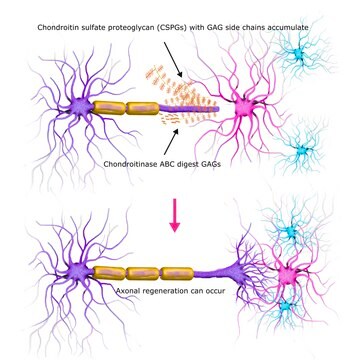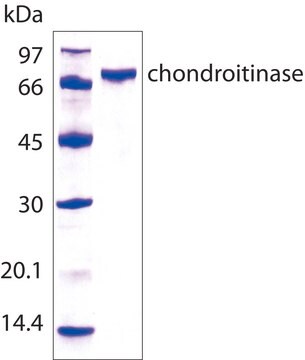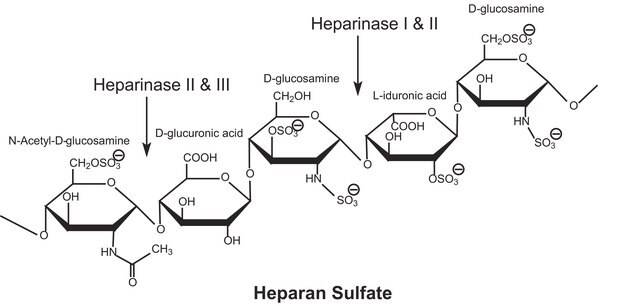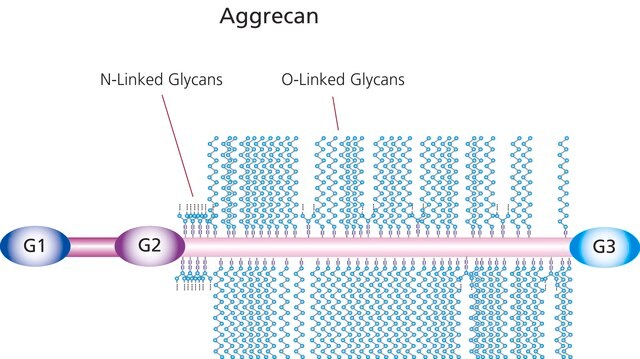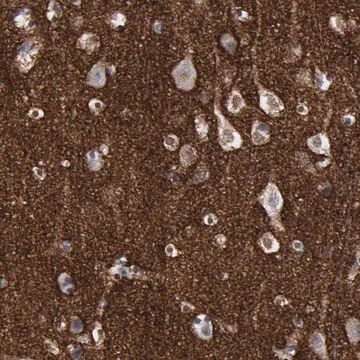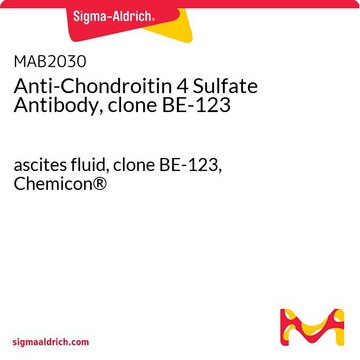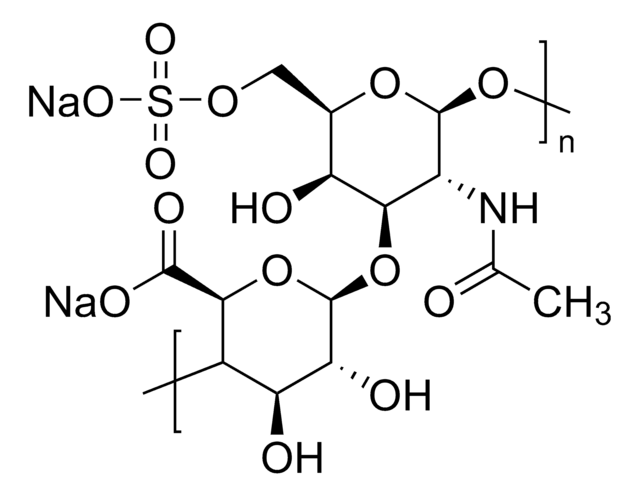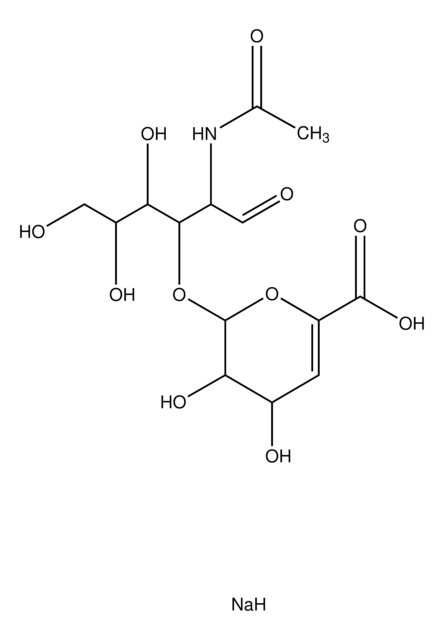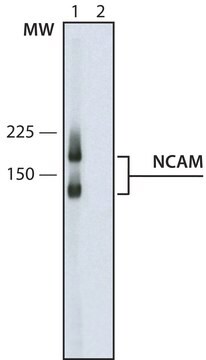C2905
Chondroitinase ABC from Proteus vulgaris
lyophilized powder, 0.3-3 units/mg solid
Synonym(s):
Chondroitin ABC Lyase
Sign Into View Organizational & Contract Pricing
All Photos(2)
About This Item
Recommended Products
biological source
bacterial (Proteus vulgaris)
Quality Level
conjugate
(Glucosaminoglycan)
form
lyophilized powder
specific activity
0.3-3 units/mg solid
mol wt
~120 kDa by gel filtration
composition
Protein, ~35% biuret
application(s)
diagnostic assay manufacturing
storage temp.
−20°C
Looking for similar products? Visit Product Comparison Guide
Related Categories
Application
Chondroitinase ABC from Sigma has been used to digest O-linked chondroitin sulfate-like glycosaminoglycan (CSGAG). The enzyme has also been used to digest glycosaminoglycan chains in proteoglycans during the construction and expression of a recombinant versican gene in mammalian systems. Furthermore, it has been used to digest chondroitin sulfate in the proteoglycan complexes. The enzyme has also been used in the removal of glycan chains from aggrecan, which eliminates the axon growth-inhibitory effect of aggrecan.
Biochem/physiol Actions
Chondroitinase ABC catalyzes the eliminative degradation of polysaccharides containing (1-4)-β-D-hexosaminyl and (1-3)-β-D-glucuronosyl (or (1-3)-α-L-iduronosyl) linkages to disaccharides containing 4-deoxy-β-D-gluc-4-enuronosyl groups. It acts on chondroitin 4-sulfate, chondroitin 6-sulfate, and dermatan sulfate. However, it acts slowly on hyaluronate. The molecular weight is approximately 120 kDa with 2 non-identical subunits of molecular masses 86 kDa and 32 kDa. The pH optimum is 8.0 with chondroitin sulfate and 6.8 with hyaluronic acid. The optimal temperature is 37 °C. 1 mM Zn2+ acts as an inhibitor, while 0.05 M acetate is an activator of the enzyme.
Packaging
Packages based on chondroitinase C activity.
Unit Definition
One unit will liberate 1.0 μmole of a mixture of 2-acetamido-2-deoxy-3-O-(β-D-gluc-4-ene-pyranosyluronic acid)-4-O-sulfo-D-galactose and 1.0 μmole of 2-acetamido-2-deoxy-3-O-(β-D-gluc-4-ene-pyranosyluronic acid)-6-O-sulfo-D-galactose from chondroitin sulfate from shark cartilage, per min at pH 8.0 at 37 °C.
Physical form
Lyophilized powder containing Tris buffer salts
Preparation Note
Reconstitute in a 0.01% bovine serum albumin aqueous (BSA) solution. Subsequent dilutions can be made into a buffer containing 50 mM Tris, pH 8.0, with 60 mM sodium acetate and 0.02% BSA. Solutions should be freshly prepared.
Other Notes
View more information on enzymes for complex carbohydrate analysis at www.sigma-aldrich.com/enzymeexplorer
Storage Class Code
11 - Combustible Solids
WGK
WGK 3
Flash Point(F)
Not applicable
Flash Point(C)
Not applicable
Personal Protective Equipment
dust mask type N95 (US), Eyeshields, Gloves
Choose from one of the most recent versions:
Already Own This Product?
Find documentation for the products that you have recently purchased in the Document Library.
Customers Also Viewed
G A de Munk et al.
The Biochemical journal, 290 ( Pt 3), 655-659 (1993-03-15)
Thrombomodulin (TM), a membrane proteoglycan on endothelial cells, binds thrombin in a 1:1 complex, accelerates the protein C activation by thrombin, promotes the thrombin inactivation by antithrombin III and inhibits the procoagulant properties of thrombin. The inactivation of single-chain urokinase-type
Y Zhang et al.
The Journal of biological chemistry, 273(33), 21342-21351 (1998-08-08)
Versican is a member of the large aggregating chondroitin sulfate proteoglycan family. We have expressed in NIH3T3 fibroblasts a recombinant versican mini-gene comprising the G1 and G3 domains and 15% of the CS domain. We observed that expression of the
Mafalda Resende et al.
International journal for parasitology, 39(11), 1195-1204 (2009-03-28)
Individuals living in areas with high Plasmodium falciparum transmission acquire immunity to malaria over time and adults have a markedly reduced risk of contracting severe disease. However, pregnant women constitute an important exception. Pregnancy-associated malaria is a major cause of
Nicolett Kanyo et al.
Scientific reports, 10(1), 22422-22422 (2021-01-01)
The glycocalyx is thought to perform a potent, but not yet defined function in cellular adhesion and signaling. Since 95% of cancer cells have altered glycocalyx structure, this role can be especially important in cancer development and metastasis. The glycocalyx
Francisca Yosaatmadja et al.
Malaria journal, 7, 51-51 (2008-03-28)
Malaria in pregnancy is characterized by accumulation of infected erythrocytes (IE) in the placenta. The key ligand identified as mediating this process is a Plasmodium falciparum erythrocyte membrane protein 1 family member, termed VAR2CSA. VAR2CSA appears to be the main
Articles
Glycosaminoglycans are large linear polysaccharides constructed of repeating disaccharide units.
Our team of scientists has experience in all areas of research including Life Science, Material Science, Chemical Synthesis, Chromatography, Analytical and many others.
Contact Technical Service